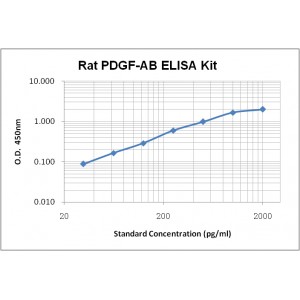More info
Assay Range | 31.2-2,000 pg/mL |
Sensitivity | 3.0 pg/mL |
Specificity | No cross-reaction with other related substances detected |
Size | 96T |
Storage | Store at 2 - 8ºC. Keep reconstituted standard and detection Ab at -20 ºC |
Assay Principle | Sandwich ELISA |
Sample Volume | 100 µL final volume, dilution factor varies on samples |
Detection Method | Chromogenic |
Kit Components
1. Recombinant Rat PDGF-AB standard: 2 vials
2. One 96-well plate coated with Rat PDGF-AB Ab
3. Sample diluent buffer: 12 mL - 1
4. Detection antibody: 130 µL, dilution 1:100
5. Streptavidin-HRP: 130 µL, dilution 1:100
6. Antibody diluent buffer: 12 mL x1
7. Streptavidin-HRP diluent buffer: 12 mL x1
8. TMB developing agent: 10 mL x1
9. Stop solution: 10 mL x1
10. Washing solution (20x): 25 mL x1
Background
PDGF (Platelet-Derived Growth Factor) represents a small group of proteins encoded by four distinct genes in which two genes (PDGF-C and -D) encode the CUB (C1r/Cls, Urchin EGF-like, and BMP1-1) domain, while the others (PDGF-A and -B) do not. PDGF-AB is the covalent heterodimer composed of the PDGF A and B chains. All PDGFs are synthesized as inactive propeptides that are further proteolytically processed to become active. Mature PDGF-AB is formed intracellularly by the initial dimerization of PDGF-A and -B proprecursors, followed by the subsequent cleavage of each chain’s profragments. Mature human PDGF-A and -B share 95% and 89% aa sequence identity with mouse PDGF-A and-B, respectively. Mature mouse and rat PDGF-A as well as PDGF-B are 99% identical. Expression of PDGF-AB has been detected in platelets, endothelial cells, keratinocytes, macrophages, retinal pigment epithelium and neurons.
Many different types of receptors are involved in PDGF-mediated signaling pathways. The classical receptor(s) for PDGF is proposed to be either a homodimer or heterodimer created from two type I transmembrane receptor tyrosine kinases termed PDGF Rα and PDGF Rβ. In vitro studies indicated that the αα homodimer would bind PDGF-AA, -AB, -BB, and -CC, the αβ heterodimer would bind -AB, -BB and -CC, and the ββ homodimer would bind -BB and -DD. Other receptors that bind to PDGF include LRP1, FGFR1, neuropilin-1, and SorLA/LR11. PDGF-AB exhibits potent chemotactic activities and mitogenic capability for multiple cell types.


